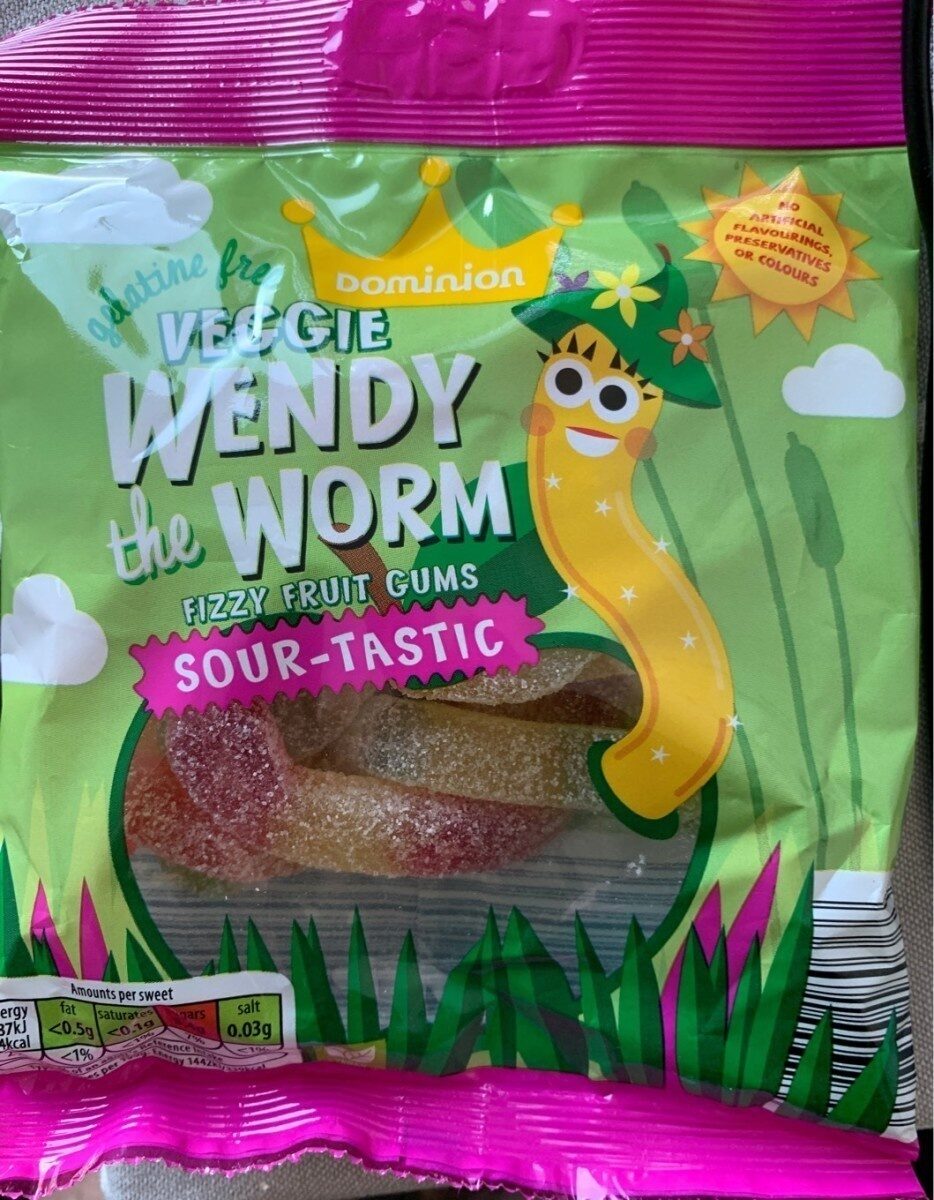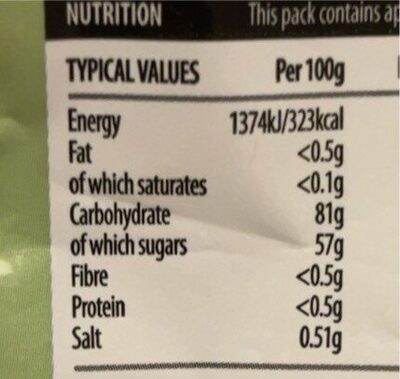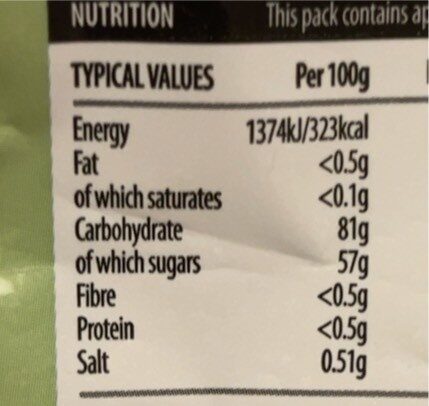Help us make food transparency the norm!
As a non-profit organization, we depend on your donations to continue informing consumers around the world about what they eat.
The food revolution starts with you!
Veggie Wendy The Worm Fizzy Fruit Gums - Wilko - 170 g
Veggie Wendy The Worm Fizzy Fruit Gums - Wilko - 170 g
This product page is not complete. You can help to complete it by editing it and adding more data from the photos we have, or by taking more photos using the app for Android or iPhone/iPad. Thank you!
×
Barcode: 4088600180366 (EAN / EAN-13)
Quantity: 170 g
Packaging: Mixed plastic-packet
Categories: Snacks, Sweet snacks, Confectioneries, Candies, Gummi candies
Labels, certifications, awards: Vegetarian, Vegan, No artificial colors
Stores: Aldi
Countries where sold: Ireland
Matching with your preferences
Health
Ingredients
-
39 ingredients
sugar, glucose syrup, glucose-fructose syrup, modified potato starch, acids: malic acid, lactic acid, citric acid, maize starch, water, concentrated fruit juices (concentrated apple juice, concentrated apricot juice, concentrated banana, juice, concentrated blackcurrant juice, concentrated cherry juice, concentrated grape juice, concentrated grapefruit juice, concentrated lemon juice, concentrated orange juice, concentrated passion fruit juice, concentrated peach juice, concentrated pear juice, concentrated pineapple juice, concentrated raspberry juice, concentrated strawberry juice), flavourings, acidity regulator: sodium citrates, plant extracts (carrot concentrate, spirulina concentrate, apple concentrate, radish concentrate, blackcurrant concentrate, safflower concentrate) glazing agent: carnauba wax
Food processing
-
Ultra processed foods
Elements that indicate the product is in the 4 - Ultra processed food and drink products group:
- Additive: E903 - Carnauba wax
- Ingredient: Flavouring
- Ingredient: Glazing agent
- Ingredient: Glucose
- Ingredient: Glucose syrup
Food products are classified into 4 groups according to their degree of processing:
- Unprocessed or minimally processed foods
- Processed culinary ingredients
- Processed foods
- Ultra processed foods
The determination of the group is based on the category of the product and on the ingredients it contains.
Additives
-
E270 - Lactic acid
Lactic acid: Lactic acid is an organic compound with the formula CH3CH-OH-COOH. In its solid state, it is white and water-soluble. In its liquid state, it is colorless. It is produced both naturally and synthetically. With a hydroxyl group adjacent to the carboxyl group, lactic acid is classified as an alpha-hydroxy acid -AHA-. In the form of its conjugate base called lactate, it plays a role in several biochemical processes. In solution, it can ionize a proton from the carboxyl group, producing the lactate ion CH3CH-OH-CO−2. Compared to acetic acid, its pKa is 1 unit less, meaning lactic acid deprotonates ten times more easily than acetic acid does. This higher acidity is the consequence of the intramolecular hydrogen bonding between the α-hydroxyl and the carboxylate group. Lactic acid is chiral, consisting of two optical isomers. One is known as L--+--lactic acid or -S--lactic acid and the other, its mirror image, is D--−--lactic acid or -R--lactic acid. A mixture of the two in equal amounts is called DL-lactic acid, or racemic lactic acid. Lactic acid is hygroscopic. DL-lactic acid is miscible with water and with ethanol above its melting point which is around 17 or 18 °C. D-lactic acid and L-lactic acid have a higher melting point. In animals, L-lactate is constantly produced from pyruvate via the enzyme lactate dehydrogenase -LDH- in a process of fermentation during normal metabolism and exercise. It does not increase in concentration until the rate of lactate production exceeds the rate of lactate removal, which is governed by a number of factors, including monocarboxylate transporters, concentration and isoform of LDH, and oxidative capacity of tissues. The concentration of blood lactate is usually 1–2 mM at rest, but can rise to over 20 mM during intense exertion and as high as 25 mM afterward. In addition to other biological roles, L-lactic acid is the primary endogenous agonist of hydroxycarboxylic acid receptor 1 -HCA1-, which is a Gi/o-coupled G protein-coupled receptor -GPCR-.In industry, lactic acid fermentation is performed by lactic acid bacteria, which convert simple carbohydrates such as glucose, sucrose, or galactose to lactic acid. These bacteria can also grow in the mouth; the acid they produce is responsible for the tooth decay known as caries. In medicine, lactate is one of the main components of lactated Ringer's solution and Hartmann's solution. These intravenous fluids consist of sodium and potassium cations along with lactate and chloride anions in solution with distilled water, generally in concentrations isotonic with human blood. It is most commonly used for fluid resuscitation after blood loss due to trauma, surgery, or burns.Source: Wikipedia
-
E296 - Malic acid
Malic acid: Malic acid is an organic compound with the molecular formula C4H6O5. It is a dicarboxylic acid that is made by all living organisms, contributes to the pleasantly sour taste of fruits, and is used as a food additive. Malic acid has two stereoisomeric forms -L- and D-enantiomers-, though only the L-isomer exists naturally. The salts and esters of malic acid are known as malates. The malate anion is an intermediate in the citric acid cycle.Source: Wikipedia
-
E330 - Citric acid
Citric acid is a natural organic acid found in citrus fruits such as lemons, oranges, and limes.
It is widely used in the food industry as a flavor enhancer, acidulant, and preservative due to its tart and refreshing taste.
Citric acid is safe for consumption when used in moderation and is considered a generally recognized as safe (GRAS) food additive by regulatory agencies worldwide.
-
E331 - Sodium citrates
Sodium citrate: Sodium citrate may refer to any of the sodium salts of citrate -though most commonly the third-: Monosodium citrate Disodium citrate Trisodium citrateThe three forms of the salt are collectively known by the E number E331. Sodium citrates are used as acidity regulators in food and drinks, and also as emulsifiers for oils. They enable cheeses to melt without becoming greasy.Source: Wikipedia
-
E903 - Carnauba wax
Carnauba wax: Carnauba -; Portuguese: carnaúba [kaʁnɐˈubɐ]-, also called Brazil wax and palm wax, is a wax of the leaves of the palm Copernicia prunifera -Synonym: Copernicia cerifera-, a plant native to and grown only in the northeastern Brazilian states of Piauí, Ceará, Maranhão, Bahia, and Rio Grande do Norte. It is known as "queen of waxes" and in its pure state, usually comes in the form of hard yellow-brown flakes. It is obtained from the leaves of the carnauba palm by collecting and drying them, beating them to loosen the wax, then refining and bleaching the wax.Source: Wikipedia
Ingredients analysis
-
Palm oil free
No ingredients containing palm oil detected
-
Vegan
No non-vegan ingredients
-
Vegetarian
No non-vegetarian ingredients detected
-
Details of the analysis of the ingredients
: sugar, glucose syrup, glucose-fructose syrup, modified potato starch, acids (malic acid), lactic acid, citric acid, maize starch, water, fruit juices (concentrated apple juice, apricot juice, banana, juice, blackcurrant, cherry juice, concentrated grape juice, concentrated grapefruit juice, concentrated lemon juice, concentrated orange juice, passion fruit juice, peach juice, pear juice, concentrated pineapple juice, concentrated raspberry juice, concentrated strawberry juice), flavourings, acidity regulator (sodium citrates), plant extracts (carrot concentrate, spirulina concentrate, apple, radish, blackcurrant, safflower concentrate), glazing agent (carnauba wax)- sugar -> en:sugar - vegan: yes - vegetarian: yes - ciqual_proxy_food_code: 31016 - percent_min: 7.14285714285714 - percent_max: 100
- glucose syrup -> en:glucose-syrup - vegan: yes - vegetarian: yes - ciqual_proxy_food_code: 31016 - percent_min: 0 - percent_max: 50
- glucose-fructose syrup -> en:glucose-fructose-syrup - vegan: yes - vegetarian: yes - ciqual_food_code: 31077 - percent_min: 0 - percent_max: 33.3333333333333
- modified potato starch -> en:modified-potato-starch - vegan: yes - vegetarian: yes - ciqual_proxy_food_code: 9510 - percent_min: 0 - percent_max: 25
- acids -> en:acid - percent_min: 0 - percent_max: 20
- malic acid -> en:e296 - vegan: yes - vegetarian: yes - percent_min: 0 - percent_max: 20
- lactic acid -> en:e270 - vegan: yes - vegetarian: yes - percent_min: 0 - percent_max: 16.6666666666667
- citric acid -> en:e330 - vegan: yes - vegetarian: yes - percent_min: 0 - percent_max: 14.2857142857143
- maize starch -> en:corn-starch - vegan: yes - vegetarian: yes - ciqual_food_code: 9510 - percent_min: 0 - percent_max: 12.5
- water -> en:water - vegan: yes - vegetarian: yes - ciqual_food_code: 18066 - percent_min: 0 - percent_max: 11.1111111111111
- fruit juices -> en:fruit-juice - vegan: yes - vegetarian: yes - percent_min: 0 - percent_max: 10
- concentrated apple juice -> en:concentrated-apple-juice - vegan: yes - vegetarian: yes - ciqual_food_code: 2074 - percent_min: 0 - percent_max: 10
- apricot juice -> en:apricot-juice - vegan: yes - vegetarian: yes - ciqual_food_code: 13000 - percent_min: 0 - percent_max: 5
- banana -> en:banana - vegan: yes - vegetarian: yes - ciqual_food_code: 13005 - percent_min: 0 - percent_max: 3.33333333333333
- juice -> en:juice - vegan: maybe - vegetarian: maybe - percent_min: 0 - percent_max: 2.5
- blackcurrant -> en:blackcurrant - vegan: yes - vegetarian: yes - ciqual_food_code: 13007 - percent_min: 0 - percent_max: 2
- cherry juice -> en:cherry-juice - vegan: yes - vegetarian: yes - ciqual_food_code: 13008 - percent_min: 0 - percent_max: 1.66666666666667
- concentrated grape juice -> en:concentrated-grape-juice - vegan: yes - vegetarian: yes - ciqual_food_code: 13112 - percent_min: 0 - percent_max: 1.42857142857143
- concentrated grapefruit juice -> en:concentrated-grapefruit-juice - vegan: yes - vegetarian: yes - percent_min: 0 - percent_max: 1.25
- concentrated lemon juice -> en:concentrated-lemon-juice - vegan: yes - vegetarian: yes - ciqual_food_code: 2028 - percent_min: 0 - percent_max: 1.11111111111111
- concentrated orange juice -> en:concentrated-orange-juice - vegan: yes - vegetarian: yes - ciqual_proxy_food_code: 2070 - percent_min: 0 - percent_max: 1
- passion fruit juice -> en:passion-fruit-juice - vegan: yes - vegetarian: yes - ciqual_food_code: 13016 - percent_min: 0 - percent_max: 0.909090909090909
- peach juice -> en:peach-juice - vegan: yes - vegetarian: yes - percent_min: 0 - percent_max: 0.833333333333333
- pear juice -> en:pear-juice - vegan: yes - vegetarian: yes - percent_min: 0 - percent_max: 0.769230769230769
- concentrated pineapple juice -> en:concentrated-pineapple-juice - vegan: yes - vegetarian: yes - ciqual_food_code: 13716 - percent_min: 0 - percent_max: 0.714285714285714
- concentrated raspberry juice -> en:concentrated-raspberry-juice - vegan: yes - vegetarian: yes - ciqual_food_code: 13015 - percent_min: 0 - percent_max: 0.666666666666667
- concentrated strawberry juice -> en:strawberry-juice-concentrate - vegan: yes - vegetarian: yes - ciqual_food_code: 13014 - percent_min: 0 - percent_max: 0.666666666666667
- flavourings -> en:flavouring - vegan: maybe - vegetarian: maybe - percent_min: 0 - percent_max: 5
- acidity regulator -> en:acidity-regulator - percent_min: 0 - percent_max: 5
- sodium citrates -> en:e331 - vegan: yes - vegetarian: yes - percent_min: 0 - percent_max: 5
- plant extracts -> en:plant-extracts - vegan: yes - vegetarian: yes - percent_min: 0 - percent_max: 5
- carrot concentrate -> en:carrot-concentrate - vegan: yes - vegetarian: yes - ciqual_food_code: 20009 - percent_min: 0 - percent_max: 5
- spirulina concentrate -> en:spirulina-concentrate - vegan: yes - vegetarian: yes - ciqual_proxy_food_code: 20984 - percent_min: 0 - percent_max: 2.5
- apple -> en:apple - vegan: yes - vegetarian: yes - ciqual_food_code: 13050 - percent_min: 0 - percent_max: 1.66666666666667
- radish -> en:radish - vegan: yes - vegetarian: yes - ciqual_food_code: 20045 - percent_min: 0 - percent_max: 1.25
- blackcurrant -> en:blackcurrant - vegan: yes - vegetarian: yes - ciqual_food_code: 13007 - percent_min: 0 - percent_max: 1
- safflower concentrate -> en:safflower-concentrate - vegan: yes - vegetarian: yes - percent_min: 0 - percent_max: 0.833333333333333
- glazing agent -> en:glazing-agent - percent_min: 0 - percent_max: 5
- carnauba wax -> en:e903 - vegan: yes - vegetarian: yes - percent_min: 0 - percent_max: 5
Nutrition
-
Poor nutritional quality
⚠ ️Warning: the amount of fruits, vegetables and nuts is not specified on the label, it was estimated from the list of ingredients: 0This product is not considered a beverage for the calculation of the Nutri-Score.
Positive points: 0
- Proteins: 0 / 5 (value: 0.5, rounded value: 0.5)
- Fiber: 0 / 5 (value: 0.5, rounded value: 0.5)
- Fruits, vegetables, nuts, and colza/walnut/olive oils: 0 / 5 (value: 0.10166168212891, rounded value: 0.1)
Negative points: 16
- Energy: 4 / 10 (value: 1351, rounded value: 1351)
- Sugars: 10 / 10 (value: 57, rounded value: 57)
- Saturated fat: 0 / 10 (value: 0.1, rounded value: 0.1)
- Sodium: 2 / 10 (value: 204, rounded value: 204)
The points for proteins are not counted because the negative points are greater or equal to 11.
Nutritional score: (16 - 0)
Nutri-Score:
-
Nutrient levels
-
Fat in low quantity (0.5%)
What you need to know- A high consumption of fat, especially saturated fats, can raise cholesterol, which increases the risk of heart diseases.
Recommendation: Limit the consumption of fat and saturated fat- Choose products with lower fat and saturated fat content.
-
Saturated fat in low quantity (0.1%)
What you need to know- A high consumption of fat, especially saturated fats, can raise cholesterol, which increases the risk of heart diseases.
Recommendation: Limit the consumption of fat and saturated fat- Choose products with lower fat and saturated fat content.
-
Sugars in high quantity (57%)
What you need to know- A high consumption of sugar can cause weight gain and tooth decay. It also augments the risk of type 2 diabetes and cardio-vascular diseases.
Recommendation: Limit the consumption of sugar and sugary drinks- Sugary drinks (such as sodas, fruit beverages, and fruit juices and nectars) should be limited as much as possible (no more than 1 glass a day).
- Choose products with lower sugar content and reduce the consumption of products with added sugars.
-
Salt in moderate quantity (0.51%)
What you need to know- A high consumption of salt (or sodium) can cause raised blood pressure, which can increase the risk of heart disease and stroke.
- Many people who have high blood pressure do not know it, as there are often no symptoms.
- Most people consume too much salt (on average 9 to 12 grams per day), around twice the recommended maximum level of intake.
Recommendation: Limit the consumption of salt and salted food- Reduce the quantity of salt used when cooking, and don't salt again at the table.
- Limit the consumption of salty snacks and choose products with lower salt content.
-
-
Nutrition facts
Nutrition facts As sold
for 100 g / 100 mlCompared to: Gummi candies Energy 1,351 kj
(323 kcal)-6% Fat 0.5 g +60% Saturated fat 0.1 g -31% Carbohydrates 81 g +1% Sugars 57 g +2% Fiber 0.5 g +57% Proteins 0.5 g -86% Salt 0.51 g +318% Fruits‚ vegetables‚ nuts and rapeseed‚ walnut and olive oils (estimate from ingredients list analysis) 0.102 %
Environment
-
Eco-Score B - Low environmental impact
⚠ ️Select a country in order to include the full impact of transportation.The Eco-Score is an experimental score that summarizes the environmental impacts of food products.→ The Eco-Score was initially developped for France and it is being extended to other European countries. The Eco-Score formula is subject to change as it is regularly improved to make it more precise and better suited to each country.Life cycle analysis
-
Average impact of products of the same category: A (Score: 89/100)
Category: Jelly candy
Category: Jelly candy
- PEF environmental score: 0.21 (the lower the score, the lower the impact)
- including impact on climate change: 1.57 kg CO2 eq/kg of product
Stage Impact Agriculture
51.7 %Processing
31.1 %Packaging
7.6 %Transportation
7.3 %Distribution
2.3 %Consumption
0.0 %
Bonuses and maluses
-
Missing origins of ingredients information
Malus: -5
⚠ ️ The origins of the ingredients of this product are not indicated.
If they are indicated on the packaging, you can modify the product sheet and add them.
If you are the manufacturer of this product, you can send us the information with our free platform for producers.
-
Packaging with a medium impact
Malus: -10
Shape Material Recycling Impact Packet Plastic High
Eco-Score for this product
-
Impact for this product: B (Score: 74/100)
Product: Veggie Wendy The Worm Fizzy Fruit Gums - Wilko - 170 g
Life cycle analysis score: 89
Sum of bonuses and maluses: -15
Final score: 74/100
-
Carbon footprint
-
Equal to driving 0.8 km in a petrol car
157 g CO² per 100g of product
The carbon emission figure comes from ADEME's Agribalyse database, for the category: Jelly candy (Source: ADEME Agribalyse Database)
Stage Impact Agriculture
36.9 %Processing
38.1 %Packaging
11.9 %Transportation
12.0 %Distribution
1.1 %Consumption
0.0 %
Packaging
-
Packaging with a medium impact
-
Packaging parts
Packet (Plastic)
-
Packaging materials
Material % Packaging weight Packaging weight per 100 g of product Plastic
-
Transportation
-
Origins of ingredients
Missing origins of ingredients information
⚠ ️ The origins of the ingredients of this product are not indicated.
If they are indicated on the packaging, you can modify the product sheet and add them.
If you are the manufacturer of this product, you can send us the information with our free platform for producers.Add the origins of ingredients for this product Add the origins of ingredients for this product
Report a problem
-
Incomplete or incorrect information?
Category, labels, ingredients, allergens, nutritional information, photos etc.
If the information does not match the information on the packaging, please complete or correct it. Open Food Facts is a collaborative database, and every contribution is useful for all.
Data sources
Product added on by openfoodfacts-contributors
Last edit of product page on by naruyoko.
Product page also edited by inf, kiliweb, moon-rabbit, roboto-app, swipe-studio, teolemon, yuka.KLVMLtGsOf4oLsTgiKUt8yG_Ldf_IM56SX0dog, yuka.sY2b0xO6T85zoF3NwEKvlnBMUfCChhnUOh_6tkab6Nu0L8X5QPFc_oTxN6g.











